Tree-Climbing Goats May Actually Be Helping to Produce This Luxury Oil
We didn’t just cover this in order to post pictures of goats in trees.
Tree-Climbing Goats May Actually Be Helping to Produce This Luxury Oil
We didn’t just cover this in order to post pictures of goats in trees.
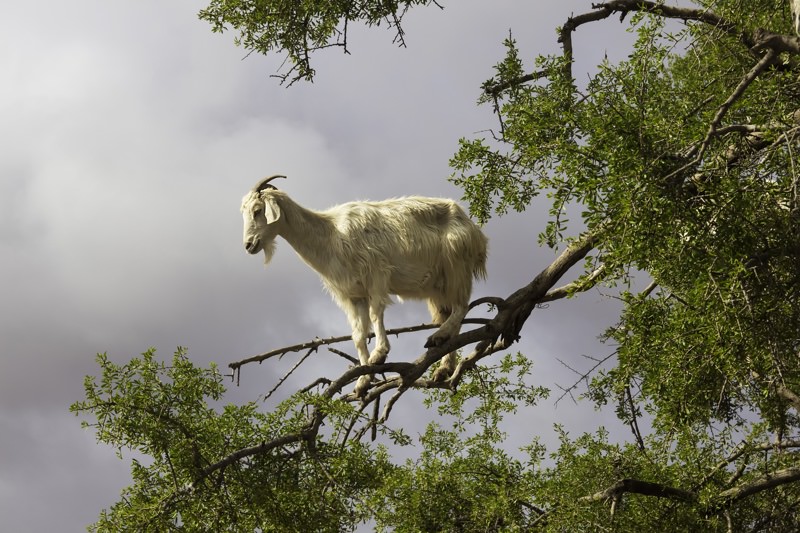
The argan tree produces hard, green, olive-like fruits containing large seeds that can be crushed to produce a highly prized oil. If the seeds are first roasted, the result is used much like olive oil; oil from non-roasted seeds is also marketed and used as a cosmetic oil for skin.
Back in 2011, UC Davis published a study voicing concern about the argan oil boom. Researchers found that the high price of the oil encouraged unsafe and unsustainable argan harvesting practices. The study suggested that one possible unwise practice involved goats. Specifically, farmers used their new argan oil money to buy goats, and those goats love to chomp on the leaves and fruits of the argan tree. Was this harming the forests?
Quite the contrary, according to a new study from researchers of the Doñana Biological Station, a public research group in Spain, which suggests that the goats not only aren’t injuring the trees, but might actually be helping them.
In the autumn, when grazing is scarce, domesticated goats in this region of Morocco spend a great deal of time perched up in the argan trees, eating fruits. Here’s where it gets interesting. Evolution has enticed fruits to be delicious to encourage a process called endozoochory, in which animals eat tasty fruits and poop out the seeds. Those seeds are dispersed somewhere away from the plant, encased in fertilizing animal manure, which allows the plant to reproduce.
But argan seeds are very big, about the size of a Brazil nut, and the goats can’t quite handle pooping something so large. (We don’t blame them.) What the researchers found is something unusual: the goats are actually gnawing the fruit off the argan seeds and then spitting them out, pretty much the same way you’d eat an olive. But because goats, like cows, are ruminants, their whole eating procedure takes longer than ours: they take it into a special stomach, then bring it back up again (this is how cows chew their cud). At that point, the goats spit out the newly cleaned argan seed after a period of time that allows them to have moved farther away from the tree – exactly what the tree wants. So it turns out that the goats might not be hurting the trees at all! They might actually be helping to propagate them.
To help you understand, here’s a series of photos of goats in argan trees. Study them closely for science. Or for fun. Your call.
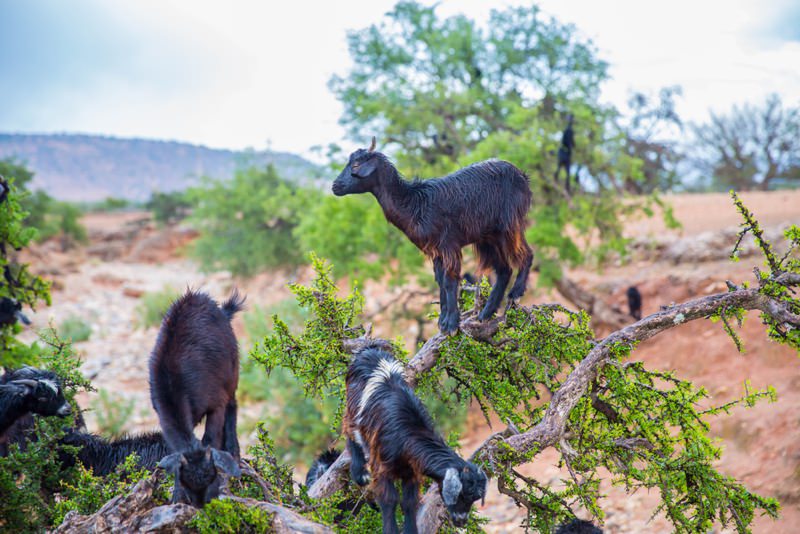
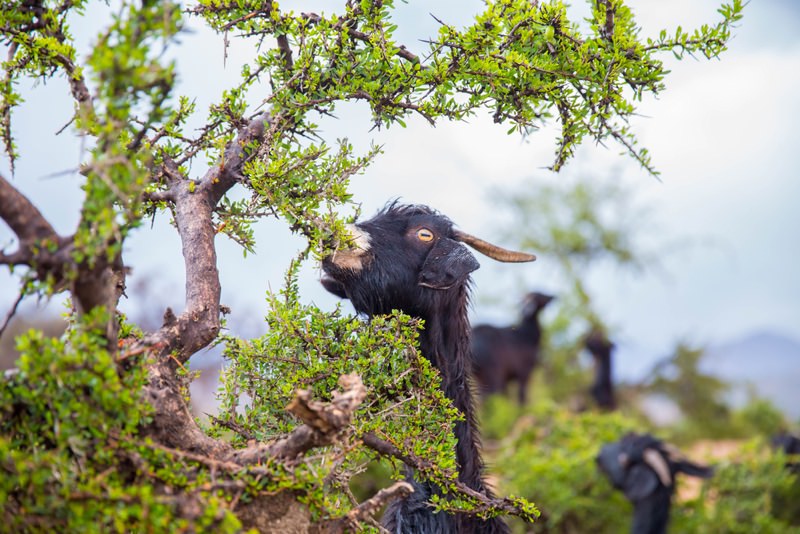
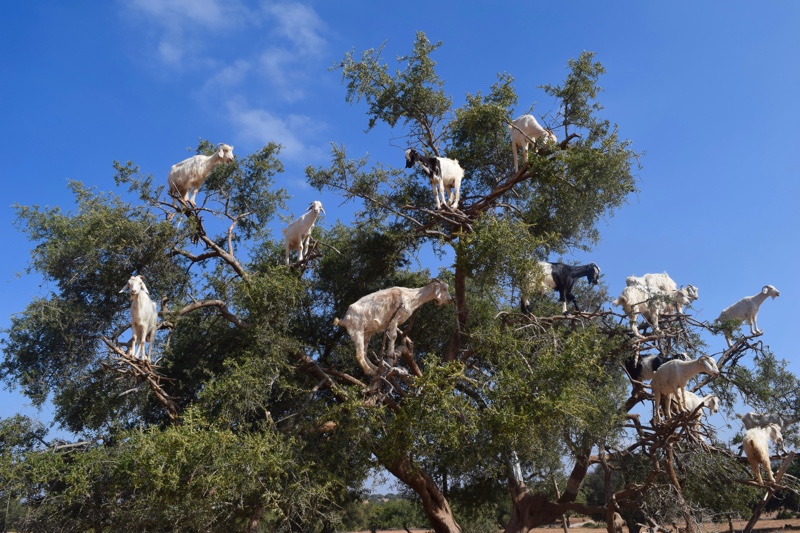
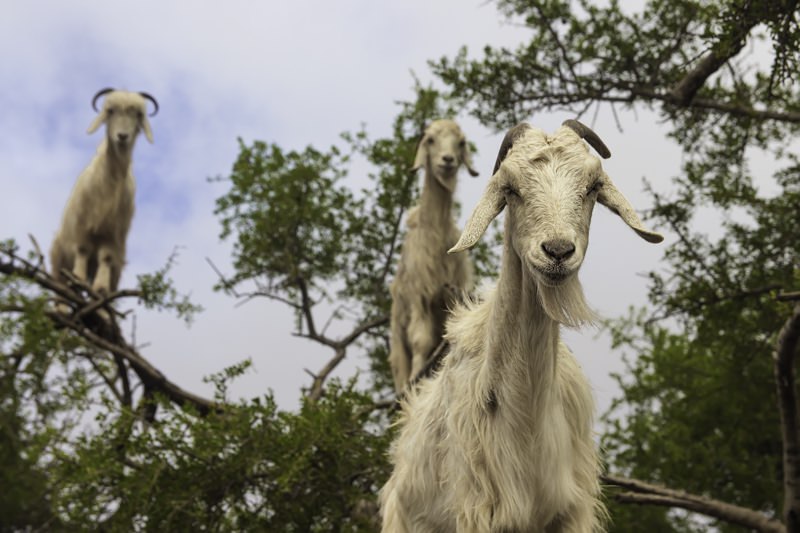

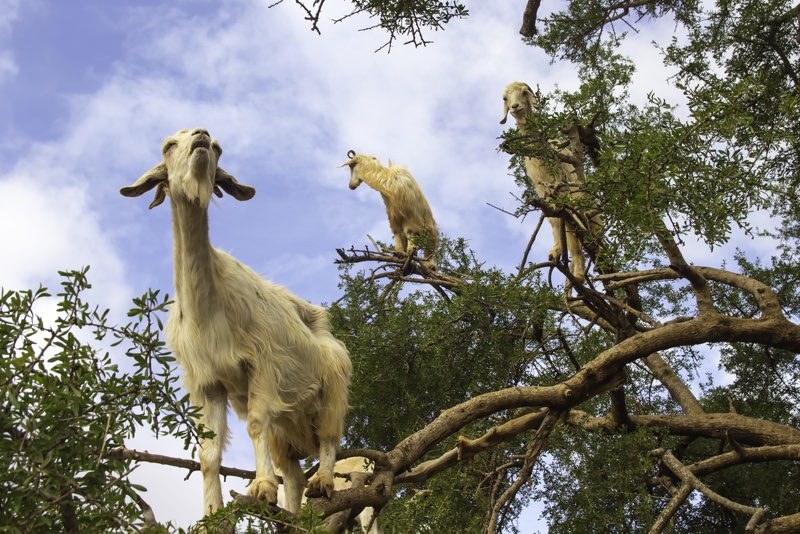
Follow us

This work is licensed under a Creative Commons Attribution-NoDerivatives 4.0 International License.
Want to republish a Modern Farmer story?
We are happy for Modern Farmer stories to be shared, and encourage you to republish our articles for your audience. When doing so, we ask that you follow these guidelines:
Please credit us and our writers
For the author byline, please use “Author Name, Modern Farmer.” At the top of our stories, if on the web, please include this text and link: “This story was originally published by Modern Farmer.”
Please make sure to include a link back to either our home page or the article URL.
At the bottom of the story, please include the following text:
“Modern Farmer is a nonprofit initiative dedicated to raising awareness and catalyzing action at the intersection of food, agriculture, and society. Read more at <link>Modern Farmer</link>.”
Use our widget
We’d like to be able to track our stories, so we ask that if you republish our content, you do so using our widget (located on the left hand side of the article). The HTML code has a built-in tracker that tells us the data and domain where the story was published, as well as view counts.
Check the image requirements
It’s your responsibility to confirm you're licensed to republish images in our articles. Some images, such as those from commercial providers, don't allow their images to be republished without permission or payment. Copyright terms are generally listed in the image caption and attribution. You are welcome to omit our images or substitute with your own. Charts and interactive graphics follow the same rules.
Don’t change too much. Or, ask us first.
Articles must be republished in their entirety. It’s okay to change references to time (“today” to “yesterday”) or location (“Iowa City, IA” to “here”). But please keep everything else the same.
If you feel strongly that a more material edit needs to be made, get in touch with us at [email protected]. We’re happy to discuss it with the original author, but we must have prior approval for changes before publication.
Special cases
Extracts. You may run the first few lines or paragraphs of the article and then say: “Read the full article at Modern Farmer” with a link back to the original article.
Quotes. You may quote authors provided you include a link back to the article URL.
Translations. These require writer approval. To inquire about translation of a Modern Farmer article, contact us at [email protected]
Signed consent / copyright release forms. These are not required, provided you are following these guidelines.
Print. Articles can be republished in print under these same rules, with the exception that you do not need to include the links.
Tag us
When sharing the story on social media, please tag us using the following: - Twitter (@ModFarm) - Facebook (@ModernFarmerMedia) - Instagram (@modfarm)
Use our content respectfully
Modern Farmer is a nonprofit and as such we share our content for free and in good faith in order to reach new audiences. Respectfully,
No selling ads against our stories. It’s okay to put our stories on pages with ads.
Don’t republish our material wholesale, or automatically; you need to select stories to be republished individually.
You have no rights to sell, license, syndicate, or otherwise represent yourself as the authorized owner of our material to any third parties. This means that you cannot actively publish or submit our work for syndication to third party platforms or apps like Apple News or Google News. We understand that publishers cannot fully control when certain third parties automatically summarize or crawl content from publishers’ own sites.
Keep in touch
We want to hear from you if you love Modern Farmer content, have a collaboration idea, or anything else to share. As a nonprofit outlet, we work in service of our community and are always open to comments, feedback, and ideas. Contact us at [email protected].by Dan Nosowitz, Modern Farmer
May 25, 2017
Modern Farmer Weekly
Solutions Hub
Innovations, ideas and inspiration. Actionable solutions for a resilient food system.
ExploreExplore other topics
Share With Us
We want to hear from Modern Farmer readers who have thoughtful commentary, actionable solutions, or helpful ideas to share.
SubmitNecessary cookies are absolutely essential for the website to function properly. This category only includes cookies that ensures basic functionalities and security features of the website. These cookies do not store any personal information.
Any cookies that may not be particularly necessary for the website to function and are used specifically to collect user personal data via analytics, ads, other embedded contents are termed as non-necessary cookies.